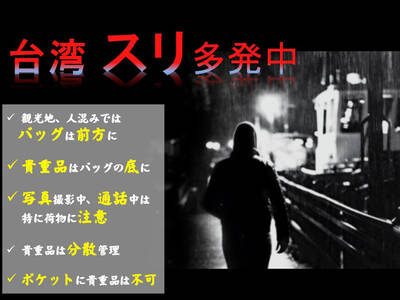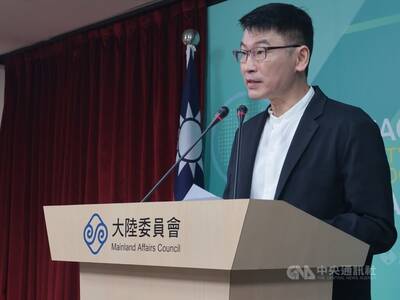Government officials yesterday reacted with indignation to British officials' conclusion that birds imported from Taiwan were the most likely source of the H5N1 virus that was found in a parrot in the UK in September.
The British officials said on Tuesday that test results showed that a parrot imported from Suriname most likely caught the lethal bug from mesias imported from Taiwan while they were all in quarantine together.
But Hu Fu-hsiung (胡富雄), vice chairman of the Council of Agriculture, said that the council had "a high degree of doubt" about the results of the British report.
On Sept. 28, 186 birds, including 100 mesias, were arrived by plane from Taiwan to England. Fifty-three of the mesias died in quarantine, according to British officials, who culled the remaining birds. British officials first alleged that Taiwanese birds may have carried and passed on H5N1 after the parrot from Suriname dropped dead on Oct. 20.
According to Watson Sung (宋華聰), head of the Bureau of Animal and Plant Health Inspection and Quarantine, there were several facts proving that the infection couldn't have come from Taiwan.
"The birds were imported from Taiwan on Sept. 28. However, they only started falling ill on Oct. 7. The virus is so virulent, that if the mesias had been infected before arriving in England, they would have fallen sick a lot faster," he said.
The British reports also showed that no tests had been done on 34 birds from Suriname which died while in quarantine before Oct. 7 -- including 18 which died before the shipment of Taiwanese birds arrived in the UK.
Sung downplayed the possibility that Taiwan had simply failed to detect that the birds had H5N1. After the Suriname parrot died and the British officials made their allegations, tests were conducted on a random selection of birds from the farm in Taichung, the origin of the birds sent to the UK. Results of the tests, which came out negative for H5N1, were released on Oct. 25.
Sung admitted that the birds shipped to the UK had not been tested for the H5N1 virus, because Taiwan was categorized as an "unaffected area" for bird flu, and so no testing was required.
But Sung said the birds had undergone several other checks and were certified as healthy before leaving for the UK.
"There was definitely no problem with the birds that left Taiwan," Sung said.
He also raised questions about how the British officials had conducted the H5N1 tests, and why birds from Suriname had been quarantined with birds from Taiwan in the first place.
"Why did they test birds from Suriname and birds from Taiwan in the same pool? Now they can't tell where the source of infection came from," he said.
According to a UK government news release, the original identification of H5N1 virus was made from a pool of tissues derived from a pionus parrot from Suriname and a mesia from Taiwan.
Sung also quibbled with the numbers in the British report, saying, "We only exported 100 mesia birds, but their reports say we exported 101. Where did such a figure come from?"
Sung said the government planned to write to both British officials and the World Organization for Animal Health to express dissatisfaction with the way the case of the dead parrot has been handled.
Furthermore, Yeh Ying (
also see story:
S&P paints grim picture of flu epidemic

The Japan-Taiwan Exchange Association has cautioned Japanese travelers to be vigilant against pickpockets at several popular tourist spots in Taiwan, including Taipei’s night markets, the Yongkang Street area, Zhongshan MRT Station, and Jiufen (九份) in New Taipei City. The advisory, titled “Recent Development of Concerns,” was posted on the association’s Web site under its safety and emergency report section. It urges travelers to keep backpacks fully zipped and carried in front, with valuables placed at the bottom of the bag. Visitors are advised to be especially mindful of their belongings when taking photos or speaking on the phone, avoid storing wallets and

ENDORSING TAIWAN: Honduran presidential candidate Nasry Afura said that Honduras was ‘100 times better off’ when it was allied with Taipei The Ministry of Foreign Affairs yesterday said it would explore the possibility of restoring diplomatic relations with Honduras based on the principle of maintaining national interests and dignity. The ministry made the remarks in response to reporters’ questions regarding an article titled: “Will Taiwan Regain a Diplomatic Ally?” published in The Diplomat on Saturday. The article said Honduras’ presidential election in November could offer Taiwan the chance to regain an ally, as multiple candidates have promoted re-establishing diplomatic relations with Taiwan. Honduras severed diplomatic ties with Taiwan in March 2023 in favor of Beijing, but since switching its diplomatic recognition,

Scoot announced yesterday that starting in October, it would increase flights between Taipei and Japan’s Narita airport and Hokkaido, and between Singapore and Taipei. The low-cost airline, a subsidiary of Singapore Airlines, also said it would launch flights to Chiang Rai in Thailand, Okinawa and Tokyo’s Haneda airport between December and March next year. Flights between Singapore and Chiang Rai would begin on Jan. 1, with five flights per week operated by an Embraer E190-E2 aircraft, Scoot said. Flights between Singapore and Okinawa would begin on Dec. 15, with three flights per week operated by Airbus A320 aircraft, the airline said. Services between Singapore

The Mainland Affairs Council (MAC) yesterday announced a ban on all current and former government officials from traveling to China to attend a military parade on Sept. 3, which Beijing is to hold to mark the 80th anniversary of the end of the Second Sino-Japanese War. "This year marks the 80th anniversary of the end of World War II and the Republic of China’s victory in the War of Resistance [Against Japan]," MAC Deputy Minister and spokesperson Liang Wen-chieh (梁文傑) told a regular news briefing in Taipei. To prevent Beijing from using the Sept. 3 military parade and related events for "united